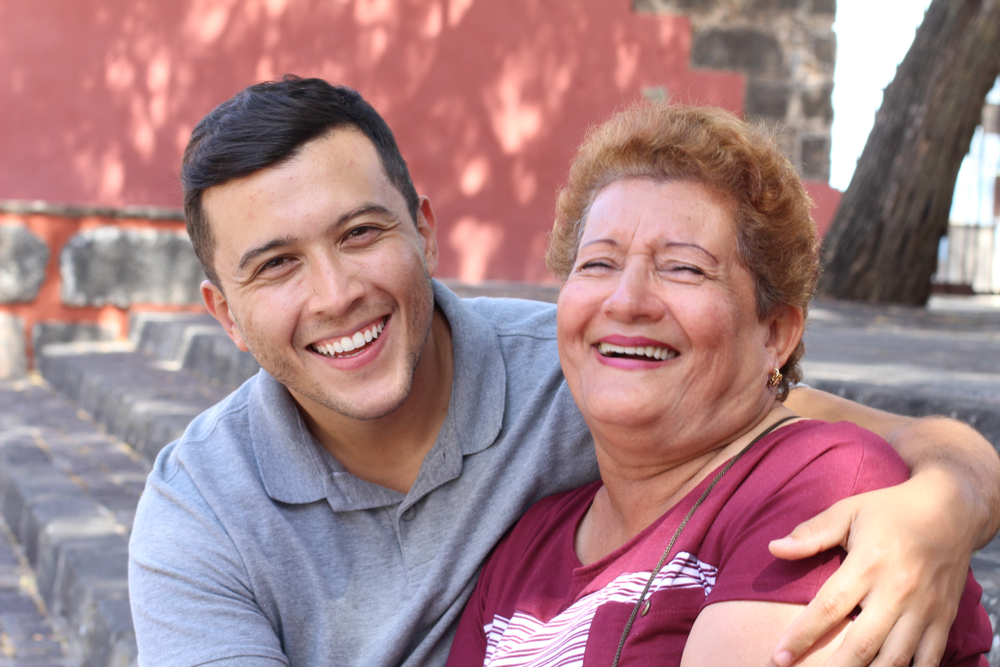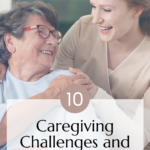
The world is changing dramatically in all kinds of ways. Global shifts in culture and economics have made caregiving a more important role than ever, while also increasing some of the challenges of being a caregiver.
Many of these difficulties relate to all caregivers, but ethnic caregivers face their own specific challenges that make life even more complex. In this post, we’re not just talking about the problems that caregivers face, but also how you can resolve them.
There isn’t always a perfect solution, that’s true. Still… there are often things you can do to make life easier and much less stressful.
Key Challenges of Being a Caregiver and Solutions
In this article, we’re taking a close look at a variety of elder care challenges. We’re focusing on those challenges that are most relevant to people from minority groups, as these problems can often be more difficult to resolve.
- Language barriers
- Discrepancies between doctors and culture
- Balancing traditional vs. modern treatments
- Maximizing visit to aging parents
- Optimizing modern technology for communication
- Family conflict and the culture of guilt
- Determining when and how to relocate an elderly person
- Accessing local community-based resources
- Handling financial and legal matters
We will also present ample resources available to families struggling to care for their elderly with dignity and respect.
1. When the English Language is a Barrier
It is well known internationally that the English language is one of the most difficult modern languages to master. It’s no wonder then that our family members learning English as a secondary language struggle to overcome the huge communication barriers that the language presents.
Even when our relatives have studied English for years, the mechanics, especially in formal medical and legal documents, can be easily misunderstood. It’s easy to see how this ends up being difficult for caregivers.
One solution for caregivers in this situation comes from Title VI of the Civil Rights Act of 1964 (which includes a prohibition against national origin discrimination affecting limited English proficient persons). Any health care provider receiving federal financial assistance is required to provide interpreter services under the law.
Additionally, Executive Order 13166, signed in 2000 by the President, “…requires Federal agencies to examine the services they provide, identify any need for services to those with limited English proficiency (LEP), and develop and implement a system to provide those services so LEP persons can have meaningful access to them.”
Your elderly relatives have a federally mandated right to language assistance. Don’t be afraid to demand these services. The law is on your side.
2. Doctors in Other Places

There is always a degree of uneasiness when one is out of his or her comfort zone in another country, especially when an immigrant elder interacts with a health care provider in the U.S.
Cultural differences are bound to make the care feel less personal. This can create confusion and distrust among elderly patients. Your aging relative may get confused with conflicting diagnoses and recommended treatments.
What is important here is to demand copies of medical records in their home country to share with your relative’s primary care doctor in the U.S. Doctors require all available records in order to make the most educated diagnoses for your loved one.
Make sure to disclose all relevant health information, including other proposed diagnoses and treatment suggestions from other doctors (abroad or in the U.S.). Make sure to keep at least one copy of these records for yourself.
Counsel your relative to be patient, attend doctor appointments with them when possible, and if not, then communicate regularly with the doctor’s staff by email and telephone.
3. Traditional Therapies vs. Modern Medications
Culture can prove to be a divide in yet another way and can lead to some major challenges of being a caregiver.
One issue is that some elderly immigrant and ethnic minority persons may prefer traditional holistic and homeopathic therapies that may contrast with the Western medicine typically provided in the U.S.
For example, traditional Mexican healers use a certain Cactus juice to treat diabetes. But the juice can interact negatively with Western diabetes medications by lowering sugar levels below normal. The same can be true of certain Chinese herbal treatments.
There also may be discrepancies between medications purchased abroad, which are less likely to have been carefully regulated by authorities. They are not always equivalent to medications manufactured in the U.S.
In order to avoid complications, be careful to emphasize to your loved one how vital it is to disclose all treatments, all medications, and all therapies to their doctor. Not doing so could lead to serious unintended harm to the elderly patient. Their doctor will not be able to prescribe appropriate remedies unless they possess the full scope of your relative’s treatment plan.
4. Maximize Your Visit

Travel, particularly international travel, is expensive, adding to elder care challenges.
When you do get the chance to visit your elderly relatives, be sure to maximize time while you are there. Make sure to complete any tasks that they may be too frail to do themselves: inspect the home, observe them closely, check in with neighbors and friends, set up a system to ease communication, and clarify legal matters, like updating powers of attorney.
Observing your loved one is extremely important.
- Are they clean and well-groomed?
- Are they forgetting to turn off the stove?
- What are they eating? Do they observe basic food safety protocols like refrigerating foods, carefully handling meats and cooking them thoroughly, throwing away leftovers before they go bad, etc.?
- Are they experiencing trouble during normal physical tasks like getting in and out of the shower?
- Can they go up and down stairs without difficulty?
- Can they reach for items in high cabinets, and so forth?
If you find these struggles adding up, you will need to begin finding solutions – the sooner the better.
- Make sure to inspect their home thoroughly.
- Check that all fire alarms and carbon monoxide detectors are in working order in case of an emergency.
- If it will be a while until you visit again, change out light bulbs and make sure the heater and/or air conditioning is in working order.
- Stock the home with emergency food just in case – canned food is best.
- Also, don’t forget to get contact information from neighbors in case you can’t reach your loved one(s).
- When you are conducting your home inspection, ask yourself the following questions:
- Do my relatives have access to a telephone they can reach? Make sure they are located fairly close to the ground in case of emergency (or if they are in a wheelchair).
- Is their home accessible and safe? Make sure showers have anti-slip mats. Anti-slip shoes are also available.
- Do they need any railings to help move about? If so, get those installed.
- Do they have a LifeAlert or other type of emergency bracelet or necklace? These can be lifesaving in case of a fall or other incident that immobilizes your loved one and provides peace of mind when you can’t be there. It provides access to emergency services 24/7 right at their wrist.
5. Communicating is Easier Than Ever
Communicating with your elderly relatives is crucial to assessing their well-being. Travel is expensive and may be inconvenient, therefore alternative ways to communicate are an absolute necessity. Luckily there are many ways to stay in touch, even “face-to-face.”
Technology offers many opportunities to see your family, reducing the challenges of being a caregiver in the process.
Skype, for instance, is a free Internet video phone that can be accessed through a computer, tablet, or mobile phone. Skype allows you to chat verbally and typing, and has a great video feature as well to see your loved one in real time. You can even send daily emails just to check-in. You can stay connected through social media.
If your loved one isn’t tech-savvy, or is unable to access these technologies, international phone calls in the United States are now cheaper than ever. Check out Google Voice, Rebtel, Vonage, Skype, and Viber for inexpensive ways to connect long-distance.
Teaching Technology Skills
As with any new skill, you’ll likely have to teach your relative how to use the service you’ve decided is most appropriate for their and your situation. It may be helpful to ask your relative’s neighbor or friend to be available the first few times you try chatting, just to be there to troubleshoot any technical issues that arise.
We often make the assumption that older adults don’t want to learn or deal with technology, but they typically catch on quickly – just remember that repetition is key. Walk them through every step in detail multiple times, then have them do it, correcting them as they go along.
Choose The Right Product
Certain devices, like tablets with large print may be easier for seniors.
There are also specially made phones for seniors that come with large number buttons, contrasting colors for visually impaired, and so forth. Low-income and ethnic minority groups are among the fastest growing user group of cell phone internet plans. Many who may not have access to a home broadband network will be able to afford a modest data plan on their phone.
6. Handling Family Conflict

In all families, especially in large families, tensions may arise between relatives who feel differently about your approach to caring for an elderly relative. There is usually tension among siblings about what should be done and who should pay for it.
Some family members are just going to be difficult and there’s no way around it. Don’t allow yourself to get unduly frustrated. It won’t help anything and you’ll just be upset.
Many family caregivers often report feeling added pressure from siblings and other relatives; sometimes, these very relatives have been only remotely or rarely involved, but have a lot to say. Don’t take their judgment personally. It’s often the case that they feel helpless and don’t know how to help.
It’s very common to see one adult child take the lead role. If that’s you, take charge, keep others in the loop, be open minded, but at the end of the day, if others are contributing very little, you have no responsibility to adhere to their wishes.
Making Things Easier
One way to reduce stress is to have a family meeting by phone or in person to discuss ahead of time who is going to be responsible for care, when they will be responsible for it, what exactly the care will entail, and how everyone will collectively pay for it. There are many resources to help mediate the caregiving process within families with this type of situation.
Geriatric Care Managers, for example, serve this function, along with orienting families to a variety of aging and social services. The important thing is to be prepared for conflict, because families who are not organized before challenges hit, are far less likely to resolve them when they occur.
7. When Relocation is Necessary
There will come a time when relocating a parent must be seriously considered. You may realize that resources and support is unavailable in your parents’ home country, and your parent is spending more time alone, isolated, and without vital resources. It’s important to start paperwork early, especially when seniors live in another country. You will also have to weigh the pros/cons of relocating the parent.
Are you ready to have them live with you? How will they get around? Do they qualify to enter subsidized senior housing or assisted living?
Talking To Your Family Member
It’s important to have an open discussion with the elder relative and consider their input. Explain your reasoning and reassure them that relocation is in their best interest, if this is what you and the family have concluded. Be sure to fully engage them in the decision-making.
Perhaps the most difficult part of relocating your aging relative will be the first discussion with them. It’s not easy to forgo one’s independent life and accept that you’ll no longer be able to live without the care of others.
When approaching this conversation try to put yourself in that person’s place: How would you like to be approached with this information? Then think about the kind of personality your relative has. What would be the best way to communicate difficult truths with them?
Often people handle hard news better if the entire family is present to shower the person with love. No matter how you hold the conversation, think the process through and have a plan for all different types of reactions. What will you do if they’re resistant? If they’re deeply saddened? If they demand to talk to someone else? Thinking through all the likely scenarios and outcomes will make it far easier for you to handle the encounter as it unfolds.
8. Culture of Guilt

Many cultures have deep-rooted expectations that adult children will care for aging parents. No matter what you do, sometimes, it’ll feel like it’s not enough. You have your own children, work, and other obligations, and may have limited time.
The task of caregiving, even when from afar, can be emotionally and financially taxing, and there are many challenges in caring for the elderly that you don’t initially anticipate.
You’re not alone. As economic hard times hit and families are dispersed, more and more families are having to get creative in making arrangements for aging relatives that don’t always fall in line with tradition.
It’s important to do away with the guilt brought on from these cultural expectations and do both what is best for you and your family, and what is within your reach. Seek the help you need, and remember to put your health first.
If you neglect your own health in the process, it’s impossible to be there for anyone else. If other family members are a major part of the guilt, review #6 above.
9. Community-Based Resources.
Many communities have an assortment of services available to elders and their caregivers including adult day services, in-home assistance with basic needs (such as bathing, dressing), transportation vouchers and other options, case managers, meal vouchers, and specialty services for people with Alzheimer’s disease.
Medicare typically covers almost none of the costs home and community-based services on a very limited basis, unless they follow an acute episode or hospitalization. Medicaid covers many of these, for those who meet the poverty level requirements for your state. For those not eligible for Medicaid, many aging and social service programs offered through your local Area Agency on Aging have services on cost-sharing basis.
These are programs that are funded by the State and the federal government through the Older Americans Act. You pay a small fee based on your budget. There are sometimes waiting lists for these services, so it’s important to inquire early on. Contact your local Area Agency on Aging, or the national Administration for Community Living.
10. Organize and plan for current and future financial and legal matters.

Financial and legal matters at the end of one’s life can become complicated quickly. Many challenges of being a caregiver come from this area. Make sure to use the services of qualified, trusted professionals in these matters. It is especially important to employ the services of professionals competent in international financial and legal matters if your relative is residing in another country. There are varying laws across the world that you will likely not be aware of.
A power of attorney should be designated to deal with legal and financial matters, as well as durable power of attorney (or health proxy) to negotiate health related issues. This can be another issue that arises between family members, with more than one sibling wishing to be the power of attorney. It is important for the primary caregiver to obtain this title for decision-making on behalf of the elderly relative.
Remember, it’s never easy dealing with all of the complications that arise during care of the elderly, but the more research you do, the more information you have, the better you can plan solutions for the challenges that lie ahead. Take care of yourself and your loved ones.
Feeling Overwhelmed?
Check out our Caregiving Consulting service for personalized support and guidance.


Leave a Reply